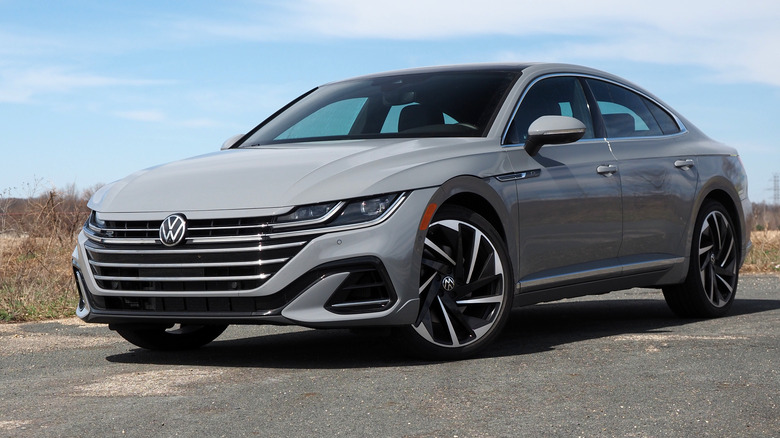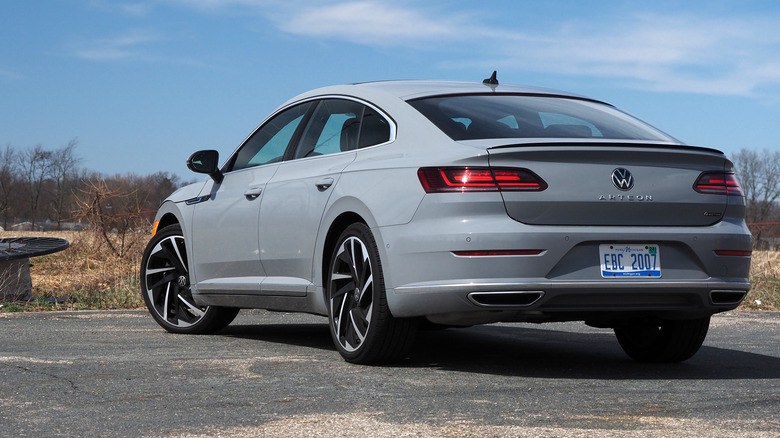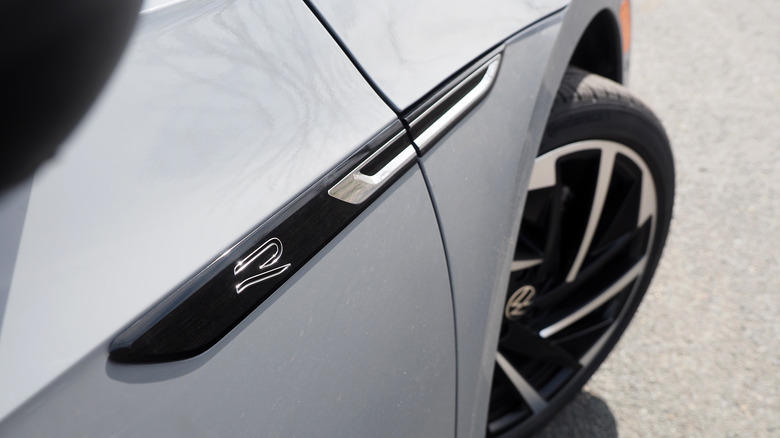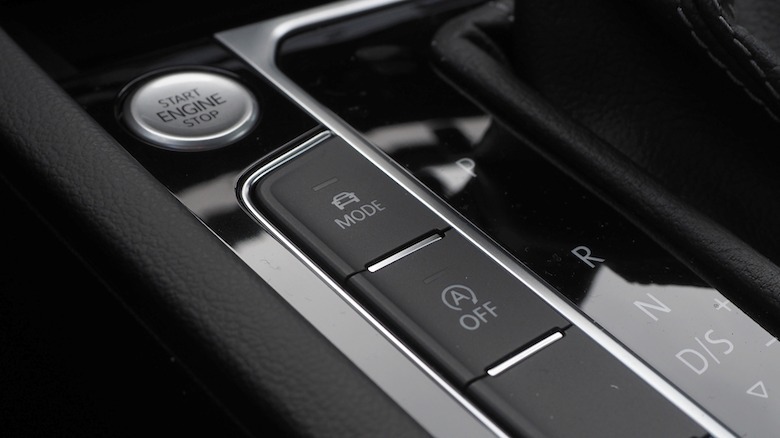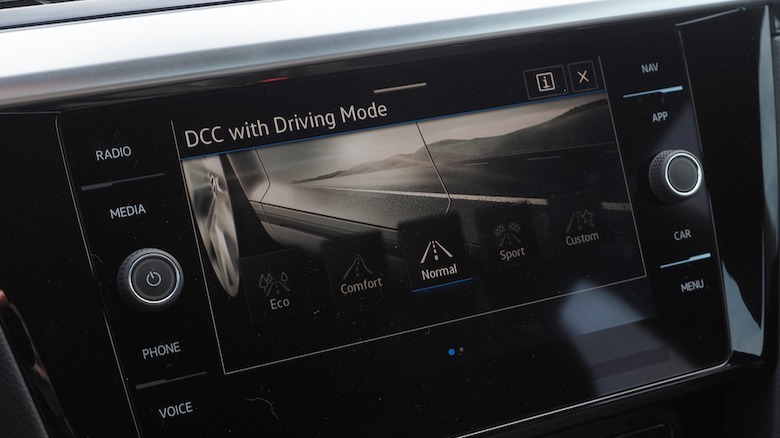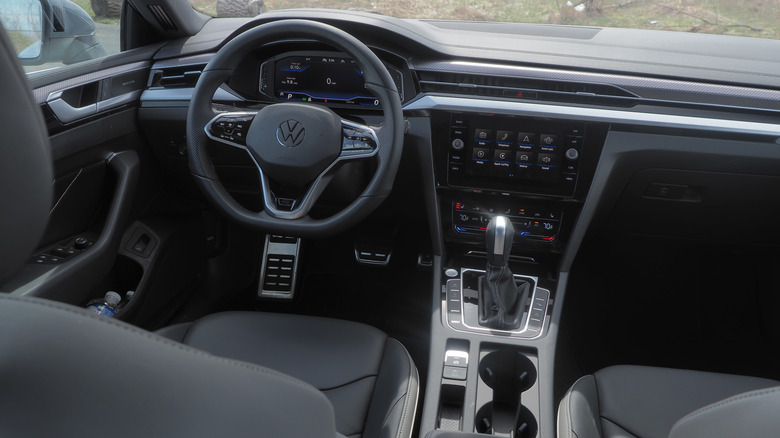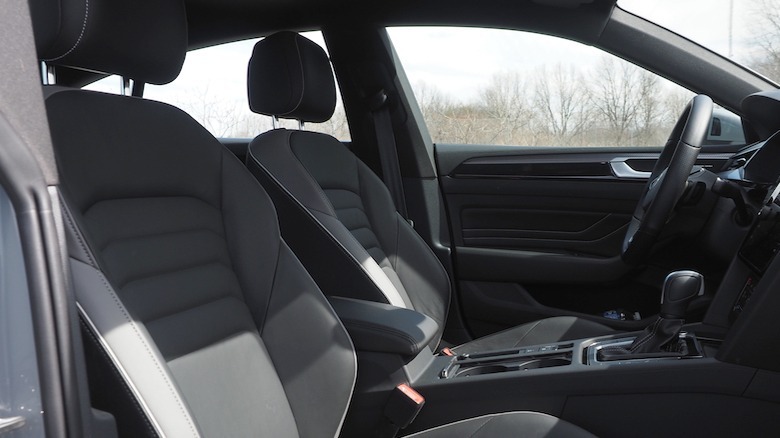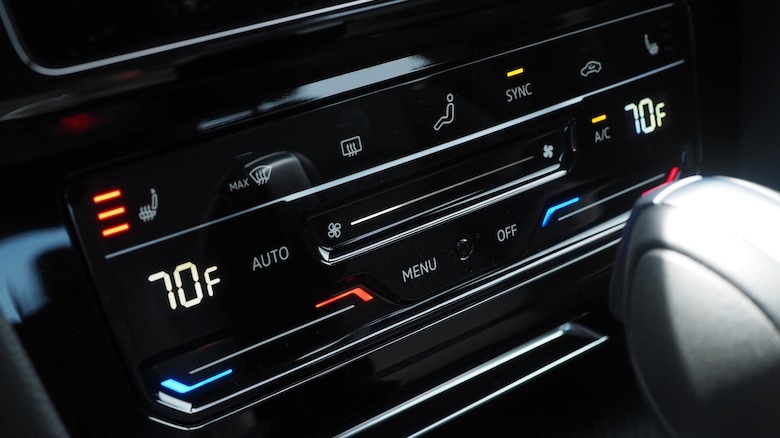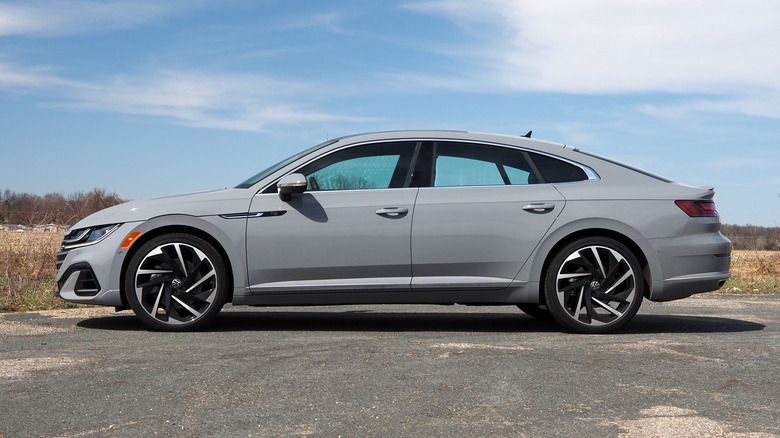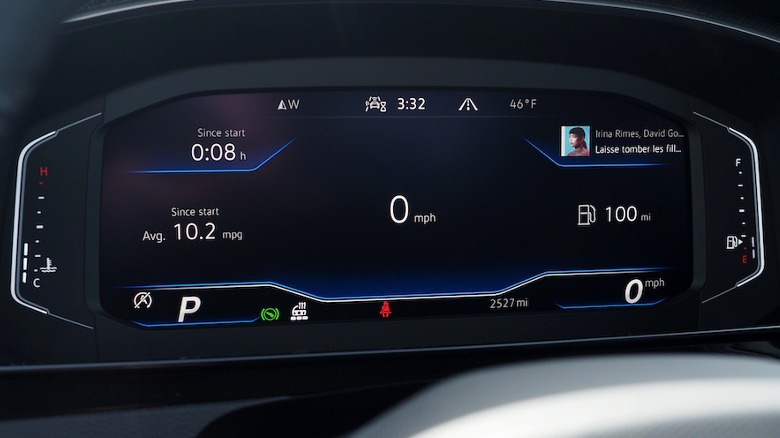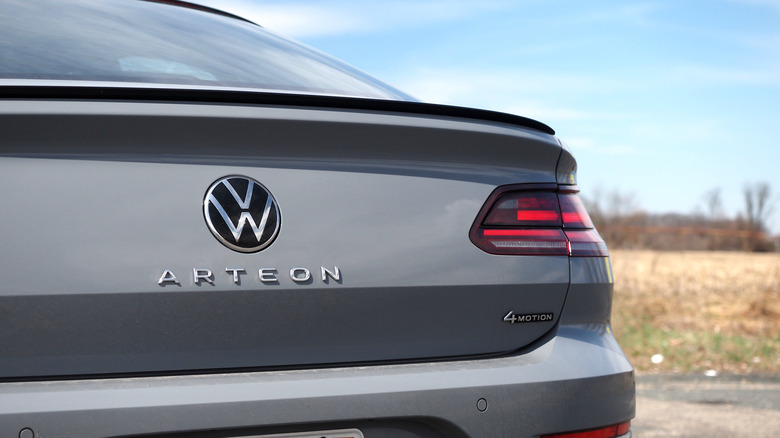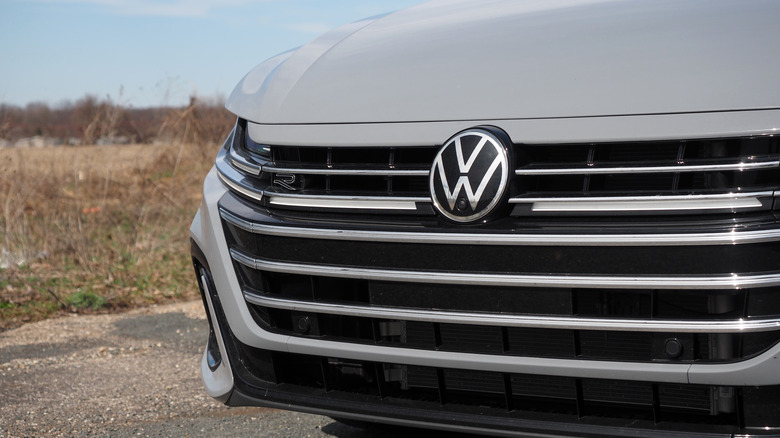2023 Volkswagen Arteon Review: A Stylish Sedan On Borrowed Time
- Style stands out amid SUVs and trucks
- Turbo-four engine is smooth and plenty powerful
- Well-equipped
- Surprisingly practical in cabin and trunk space
- Touch-sensitive controls can be frustrating
- Fuel economy is solid, not great
The parking structure is a sea of SUVs and trucks, chunky children's toys snuggled together like some cubist installation in the airport's long-term lot. Hard to spot, at first, the sharklike snout of the 2023 Volkswagen Arteon, poking cheekily between the F-150s and Silverados.
Officially a sedan, but something far more special even at first glance, the Arteon's roofline falls well short of the hoods of those pickups. Its curves susurrate with appealing discretion, at a time when most new vehicle design seems inspired by post-apocalyptic survival. Its price tag, too, could surprise you. This fashion-forward four-door starts at $43,010 (plus $1,295 destination), though it's difficult to say — given the state of the auto market in general, and the Arteon's shrinking segment specifically — if that's high or low.
The tendency of that market, to prize SUVs and put anything else out to pasture, leaves the Arteon on borrowed time. The biggest question, then, is whether we'll miss it when it's gone.
A smooth pebble among chunky trucks
The Arteon is undoubtedly the most handsome model in Volkswagen's current line-up. Though a sedan, its sleekly curvaceous body is reminiscent of Audi's stately A7, S7, and RS7: no small degree of praise, given the almost $30k premium you can pay for four-ring ownership. Though it launched back in 2017 — and received a facelift in 2020 — VW's car manages to look fresh and distinct.
At the front, the interplay between the scalloped grille and the headlamps and daytime running lamps (DRLs) is crisp and pleasing. A strong shoulder line kicks off from the corner of those squinting light clusters, runs atop wheel arches filled with up to 20-inch alloys, and then meets with a tapered rear and bold badging. The result is classic yet sporty, aided by standard R-Line bumpers, LED lighting front and rear, and a nose-spanning light bar.
The base Arteon SE R-Line makes do with 18-inch wheels, though they still look fairly striking. It's hard to argue with the fiendish-looking blades on this flagship SEL Premium R-Line trim, starting at $50,175 (plus destination). Volkswagen only offers a choice of five exterior colors, but they include bright blue and red options, along with black, white, and this Moonstone Gray.
No sports sedan, but a solid all-rounder
Under the sharply creased hood, there's VW Group's familiar 2.0-liter TSI turbocharged gas engine. There's no V6 option, but the turbo-four is no disappointment, mustering 300 horsepower and 295 lb-ft of torque. It's paired as standard with a 7-speed DSG transmission; there's no manual option, unsurprisingly, and its absence isn't really missed.
Base-spec Arteon SE R-Line cars are front-wheel drive, but from the Arteon SEL R-Line ($48,475 plus destination) and up there's 4MOTION all-wheel drive as standard. Either way, Volkswagen fits its adaptive chassis control with electronically controlled shock absorbers. These can firm up or soften depending on drive mode — there are Eco, Comfort, Normal, Sport, and the user-configurable Custom to select between — and they do a solid job of morphing the sedan from a highway cruiser to a more focused steed.
The overall result is compelling if a little conservative. Straight-line acceleration is swift, though even in Sport mode the Arteon's sensibilities lean toward serene rather than aggressive. It's all stable, easily placed, and controlled, with firm — but not too firm — steering and minimal body roll. A Golf R is going to have the edge if you find some more delightful roads, but the Arteon's smooth refinement and linear power delivery make it an excellent all-rounder.
Sober but well-equipped
Inside, Volkswagen's cabin is sober but comfortable. All trims get Volkswagen's Digital Cockpit Pro, a 10.25-inch reconfigurable gauge cluster with layouts ranging from traditional to minimal, along with wireless phone charging, an 8-inch touchscreen, and the automaker's crisp (if a little drab) infotainment system. Wireless Apple CarPlay and Android Auto are standard (though the former proved a little glitchy at times), together with twin 45W USB-C charge/data ports in the front.
Three-zone climate control and heated front comfort seats are standard. SEL trim and above get leather seats to go with the leather-wrapped steering wheel, plus a power panoramic sunroof. Step up to SEL Premium, and there's heating for the rear seats, too, along with ventilated front seats, a Harman Kardon audio system, massage for the driver, and a 45W rear charging USB-C port.
VW offers two interior color schemes. The Titan Black of this review car is, for want of a better description, dour. Stone and Raven, meanwhile, swap in some lighter seat panels and door trim, though the bulk of the dashboard remains sober. Everything is sturdy and feels premium, however, even if I'm not entirely a fan of Volkswagen's touch-sensitive HVAC controls or its touch-sensitive steering wheel buttons.
Surprisingly practical
All trims get front and rear parking sensors, blind spot warnings, and adaptive cruise control with lane assist and VW's Travel Assist. Forward collision warnings with emergency brake assist and front pedestrian monitoring are standard, too, while Park Assist and a 360-degree camera arrive on the top SEL Premium trim.
As for fuel economy, Volkswagen quotes the 2023 Arteon as being capable of 22 mpg in the city, 31 mpg on the highway, and 25 mpg combined. In my own, mixed driving — which erred a little more on highway use than urban — I saw a respectable 26.2 mpg.
While the design is clearly a focus here, that hasn't left the Arteon impractical. The trunk is 27.2 cu-ft with the rear seats up; fold that 60/40 split bench down flat, and it rises to 56.2 cu-ft. A sizable hatchback rear makes loading and unloading long and wide items unexpectedly straightforward.
A shrinking niche
Figuring out Arteon's natural competition, here, is tricky. Audi, BMW, and Mercedes all have offerings in the "swooping sedan" category, though they're thoroughly priced out of contention compared to Volkswagen's sticker. The general ousting of four-door passenger cars of this type, meanwhile, has trimmed options considerably if you're shopping on an Arteon budget.
Kia's Stinger was arguably the most obvious alternative, but the South Korean automaker opted to discontinue the sedan this year. The Nissan Maxima lacks the outright style of the Volkswagen and its all-wheel drive option, and though it may pack a V6 under the hood it can only match the Arteon's turbo-four for horsepower and is actually down on torque.
Dodge's Charger is another sedan on the chopping block, as is the Chrysler 300. Neither has the aesthetic allure of the VW, but their big displacement engines certainly still find fans among drivers. Then there's the Toyota Crown, a thoroughly oddball jacked-up hybrid sedan: it's newer and packs more power, but looks decidedly awkward next to the Arteon's silhouette.
2023 VW Arteon Verdict
Just how long the Arteon itself has left is another question, though it's one Volkswagen is yet to comment officially on. Certainly, though, the automaker's trajectory is toward electrification — something conspicuous by its absence here — and, like just about every car company, is making SUVs and crossovers a priority. The upcoming ID.7 electric sedan, based on the same MEB platform as the ID.4, seems likely to seal the fate of the avant-garde Arteon, with industry whispers suggesting 2024 will see its curtain call.
That feels like a shame, as much as it's an inevitability. I didn't expect to like the 2023 Arteon as much as I did: its combination of style, everyday usability, and decent standard equipment pair nicely with its balanced drivetrain. Aesthetically, it's still rare enough — VW sold less than 1,800 in the U.S. in the whole of 2022 — to turn heads.
There's a lot to be said for a capable all-rounder. The Arteon may amount to a rounding error in comparison to Volkswagen's SUV sales, but that feels more like an example of customer groupthink than any indictment of the sedan itself. The future may be electric, but today the 2023 Arteon feels like an under-appreciated gem that'll we'll miss more than most sedans when it finally says goodbye.
